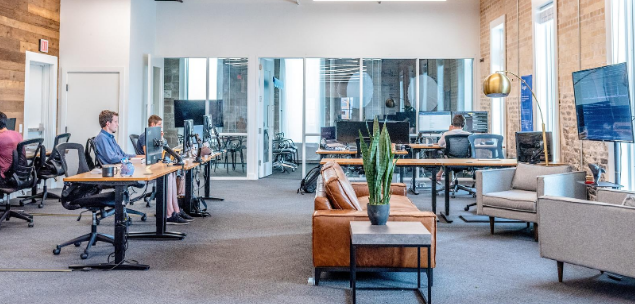New research shows that 3 in 4 working Aussies are enjoying not having to commute to work since the covid-19 outbreak disrupted normal office work; as a result, urban planner Mike Day, is calling for more self-contained, walkable neighbourhoods.
At the height of the pandemic, 46 per cent of employed Australians were working from home. New research has revealed that avoiding the commute, more time in the day, and better work-life balance were among the most positive aspects of the new working arrangement.
On the back of the research, one of Australia’s leading urban planners is calling for more self-sufficient, walkable, and liveable mixed-use and mixed-income neighbourhoods to facilitate working-from-home as a permanent workforce option.
Mike Day is Co-founder and Director of RobertsDay, an urban planning and design practice with offices in most major Australian cities. Data from a new survey – exclusive to RobertsDay – sheds light on what employees most enjoy about their remote working experience.
The independent survey was made up of nationally representative panel of 1000 Australian employees who have been working from home – full-time or part-time – during the pandemic.
On average, Australian workers normally spend 4.5 hours a week commuting to and from their workplace. Perhaps unsurprisingly then, 72 per cent of Aussies working from home said the biggest benefit was avoiding the commute and thereby gaining more time in the day. In the ACT, this constituted 94 per cent of respondents.
Mike is of the view that, because Canberrans are largely car-dependent – approximately 75 per cent rely on the car as their method of travel to work – they would have found the switch to remote working a welcome change from driving each day.
“The car is the primary mode of transport for many Canberra commuters, due to the city’s dispersed suburban pattern. However, as the survey results suggest, Canberrans enjoyed the time they spent working from their homes, probably because they reclaimed time they would normally spend driving.”
He added, “The ACT Government’s promotion of urban infill – which is resulting in more connected, compact homes in existing walkable neighbourhoods – may be an additional reason why a significant number of Canberrans enjoyed not commuting.
“In fact, residents living in the areas where urban renewal is occurring – including Civic, Tuggeranong, Dickson, Kingston, Manuka and Gungahlin – no longer need to rely so heavily on the use of vehicles. Essential amenities, including schools, dispersed workplaces and a diverse range of natural, open spaces in close proximity, are giving residents independence of movement without having to rely on using cars. Moreover, it is these households that don’t need a second car which, in turn, can save them $10,000-$12,000 per year owning and maintaining a car. This significant savings can service $300,000 of a mortgage.”
The survey also revealed that work-life balance was the second-most enjoyable aspect of working from home for nearly two-thirds (61 per cent) of respondents – and a possible reason why many would want to continue working from home more regularly.
More than half (57 per cent) loved not having to dress for work, while 36 per cent of respondents most enjoyed having fewer distractions in their home office environments as it enabled them to be more productive.
In fact, older employees were most likely to enjoy working from home for this reason: 44 per cent of over-50s cited they had less distractions and felt more productive when working from home, compared with 28 per cent of younger employees (under-30s).
When asked why else they enjoyed working remotely, a third (33 per cent) of respondents revealed it was being able to see more of their kids or other family members, 32 per cent said it was not being micro-managed, and more than a quarter (26 per cent) said it was because they had fewer meetings, and were, therefore, more productive.
Mike said, “Overall, these survey results show just how much Australian workers believe they can achieve while working from home – especially if they are not spending an hour or two commuting to and from the workplace every day.
“If employers listen to what their employees most enjoy about working from home, we may see a decentralisation of much of the workforce from the cities to the metropolitan growth areas – a key reason why we should embrace the concept of living and working ‘locally.’
“At RobertsDay, we believe the pandemic-led switch to remote working has reaffirmed that our urban growth areas should be guided by the principles espoused in the Victorian Government’s ‘20-minute neighbourhood’ Report, in which workplaces and essential services, such as schools and grocery shops, are accessible from home on foot or by bike.
“Some organisations have even found that working from home was so effective and productive for their employees that they are shifting, or have shifted, to permanent arrangements. For this reason, it’s even more crucial that we consider the urbanisation of our suburbs, so that communities can access most of their daily needs, within a 20-minute return walk from home.
“As NSW, Queensland, and the ACT face the possible prospect of a lockdown similar to that of Victoria, it presents an opportunity for all levels of government to embrace the ‘20-minute neighbourhood’ initiative and, in turn, deliver more equitable, sustainable and affordable contemporary communities that can provide a much more resilient and sustainable living environment during prolonged periods of remote working.”
Survey results
|
Q. What have been some of the most enjoyable aspects of working from home for you? |
|
|
Not commuting, therefore having more time |
72% |
|
Work-life balance |
61% |
|
Not having to dress for work |
57% |
|
Less distractions, therefore more productive |
36% |
|
Seeing my kids or other family members |
33% |
|
Not being micro-managed |
32% |
|
Less meetings, therefore more productive |
26% |

